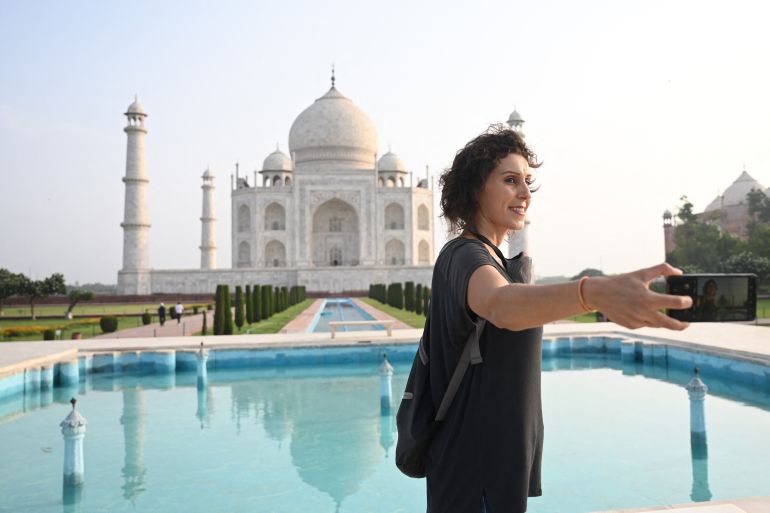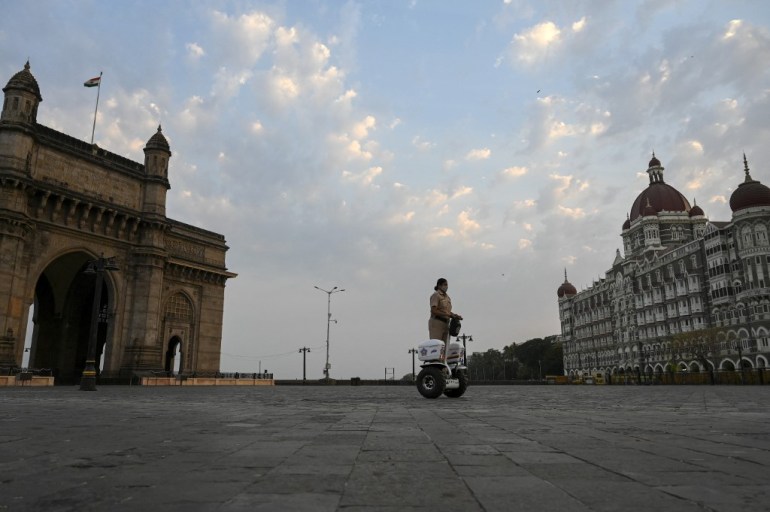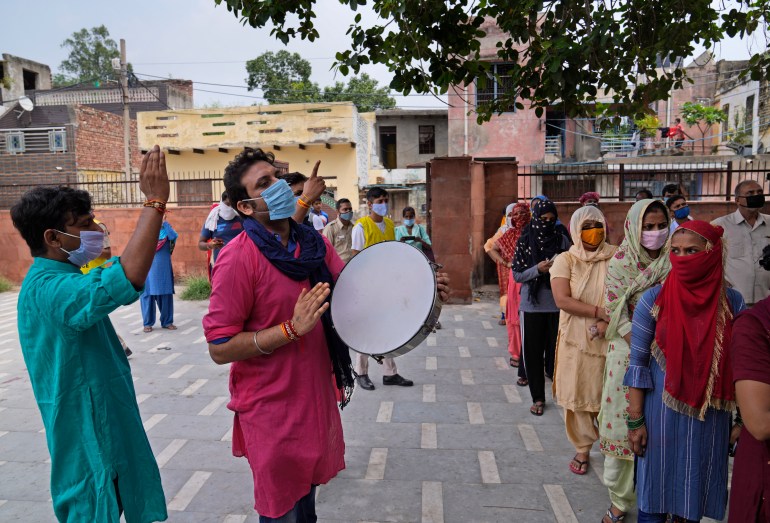India reopens for foreign tourists after 19 months as COVID ebbs
Easing of restrictions on foreign tourists visiting India coincides with the country’s domestic tourist and festive season.

India has reopened to fully vaccinated foreign tourists travelling on chartered flights in the latest easing of its coronavirus restrictions as infection numbers decline.
Foreign tourists on regular flights will be able to enter India starting from November 15, officials said on Friday.
Keep reading
list of 4 itemsIndia imposes quarantine on UK nationals in tit-for-tat move
In India, demand for Russia’s expensive Sputnik vaccine sputters
India reports lowest daily COVID cases, deaths since March
It is the first time India has allowed foreign tourists to enter the country since March 2020 when it imposed its first nationwide coronavirus lockdown.
It is unclear whether arriving tourists will have to quarantine but they must be fully vaccinated and test negative for the virus within 72 hours of their flight.

The decision, announced earlier this month by India’s home ministry, comes as the country’s daily infections have dropped below 20,000 from a peak of 400,000 in May and more people have been vaccinated.
India has administered more than 970 million vaccine doses. Nearly 70 percent of the eligible adult population has had at least one dose.
The easing of restrictions on foreign tourists visiting the country, however, coincides with India’s domestic tourist and festive season. Already, it has prompted concerns by health officials who have warned against complacency.
Earlier this month, the Indian Council of Medical Research, India’s premier medical body, cautioned that “revenge tourism” could lead to a surge in COVID-19 infections if tourists don’t strictly adhere to safety protocols.
According to official data, fewer than three million foreign tourists visited India in 2020, which was a dip of more than 75 percent as compared with 2019.
COVID testing ramped up with affordable kits
Meanwhile, a public-private partnership in India has made getting a COVID-19 test more affordable for many.
Developing and building components of the gold standard RT-PCR test at home has enabled the country to stop relying on imports and ramp up testing during the second wave of the pandemic.
Scientists at India’s most advanced bioscience innovation labs, the Centre for Cellular and Molecular Platforms, or C-CAMP, in Bengaluru city, are working with local manufacturers to develop more affordable diagnostic technologies with financial support from The Rockefeller Foundation and help from the Indian government and Tata Consultancy Services.
Since many components of the real-time reverse transcription-polymerase chain reaction – or RT-PCR – test were not manufactured in India, the country relied on imports when the pandemic first emerged in early 2020.
But that has changed.
“About 150 companies that are capable together of producing one million RT-PCR tests a day, close to about 800,000 rapid tests every single day, are already part of the cohort,” says Lalith Kishore, chief operating officer of the COVID-19 Scale-Up Programme at C-CAMP.
“A lot of these companies have enabled the complete reversal in terms of our dependence on imports with regards to diagnostics.”
In early 2020, COVID-19 tests were in short supply and very expensive due to import costs.
With global trade almost at a standstill, and huge demand for test kits from the United States and the United Kingdom, deliveries were also delayed.
When 29-year-old Sanchi Jawa and her 59-year-old father Harish Jawa first had COVID-19 symptoms during the early stage of India’s first wave of infections, they had to pay almost $70 each for a RT-PCR test.
Jawa works in digital marketing, and her father Harish runs a successful packaging business.
They could afford the test, but Jawa believes it was out of reach for the majority of the country, which, according to the World Bank, has a per-capita income of less than $160 per month.
“It (RT-PCR tests) should be, you know, accessible to the common man, and everybody should be able to get it done,” she says.
“Because most of the people, like the majority of the people who didn’t get tested was because they would be like, you know, it would cost us 800 or 2,000 or 3,000 rupees, and that’s how it spreads. You don’t get tested, and you don’t know what you’re carrying.”

Producing an affordable test was not a simple task.
At the time most RT-PCR test components – reagents, primers and mixers required to analyse samples – were not manufactured in India and had to be imported from China and South Korea, driving up the price.
Chemical components like amidites and deoxyribonucleoside triphosphates are essential for the analysis used to detect the virus’s presence.
Even accessories such as the plastic vials used in the testing process were mostly imported.
The scientists worked with Indian manufacturers to develop, scale up production and find a market for indigenously built test kits.
According to Kishore, the public-private partnership has helped more than 160 Indian companies to innovate, create mechanisms and collectively manufacture more than a million RT-PCR test kits per day.
Indian-manufactured test kits and components helped revitalise supply chains, and brought down RT-PCR test prices.
According to C-CAMP’s Director Dr Taslimarif Saiyed, producing tests indigenously was essential.
“By building more in India with reagents which are indigenously developed, the cost of this – because each reagent would cost less when we develop indigenously. Overall, kit production at the high quality, we were able to bring it down very significantly,” he said.
India’s ramp-up of COVID-19 testing capacity has enabled the country to conduct more than 580 million tests to date.
The price of RT-PCR tests has fallen to as little as $7 in some parts of the country, a near tenfold decrease from when they were first made available.
Manisha Bhinge is the Rockefeller Foundation’s Managing Director of Programs and Health Initiative.
It has pumped $3.5m into the partnership and Bhinge believes the increased availability of COVID-19 tests is now allowing the country to implement a robust surveillance programme, which in turn has helped public health experts devise precise pandemic countermeasures.
It has also created a new market for countries looking to procure diagnostic technologies according to Bhinge.
“RT-PCR kits are here to stay beyond COVID, both in India and globally,” she says.
“So, being able to diversify our production and our procurement channels beyond single source, you know, South Korea, China, allows not only India, but also, you know, the global, the low and middle-income countries at large, more stability and security and access to affordable medical technologies.”
The second wave of COVID-19 peaked in May 2021 with more than 400,000 cases being detected each day.
Bhinge believes the scope of the crisis could have been much worse without the vastly increased testing capacity.